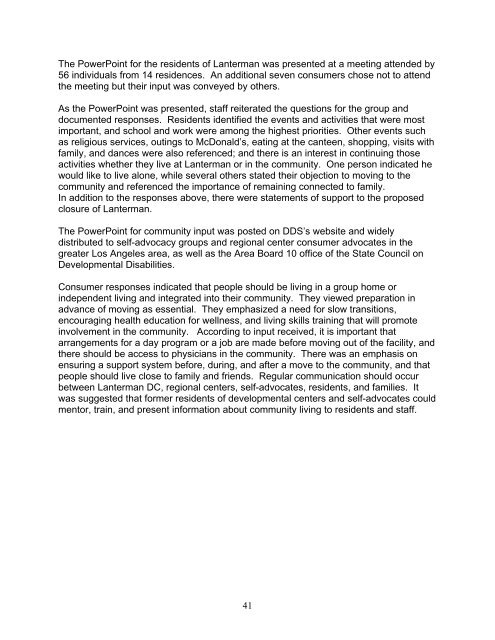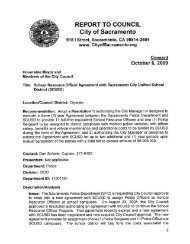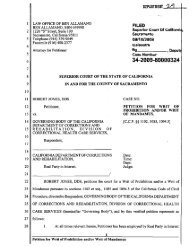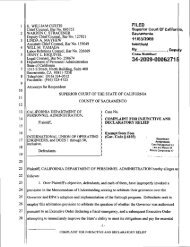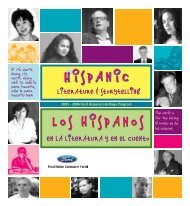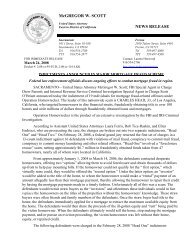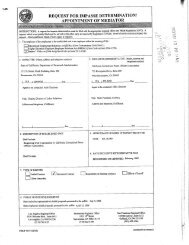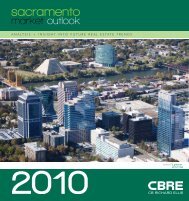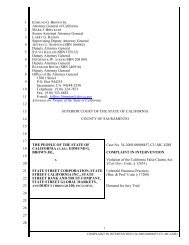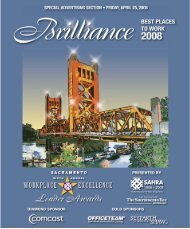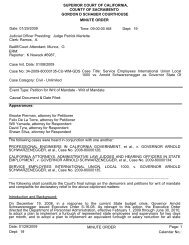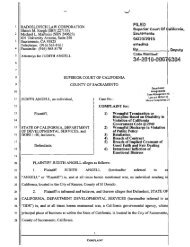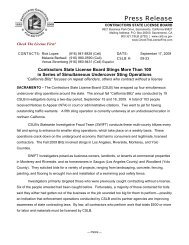Plan for the Closure of Lanterman Developmental Center
Plan for the Closure of Lanterman Developmental Center
Plan for the Closure of Lanterman Developmental Center
Create successful ePaper yourself
Turn your PDF publications into a flip-book with our unique Google optimized e-Paper software.
The PowerPoint <strong>for</strong> <strong>the</strong> residents <strong>of</strong> <strong>Lanterman</strong> was presented at a meeting attended by<br />
56 individuals from 14 residences. An additional seven consumers chose not to attend<br />
<strong>the</strong> meeting but <strong>the</strong>ir input was conveyed by o<strong>the</strong>rs.<br />
As <strong>the</strong> PowerPoint was presented, staff reiterated <strong>the</strong> questions <strong>for</strong> <strong>the</strong> group and<br />
documented responses. Residents identified <strong>the</strong> events and activities that were most<br />
important, and school and work were among <strong>the</strong> highest priorities. O<strong>the</strong>r events such<br />
as religious services, outings to McDonald’s, eating at <strong>the</strong> canteen, shopping, visits with<br />
family, and dances were also referenced; and <strong>the</strong>re is an interest in continuing those<br />
activities whe<strong>the</strong>r <strong>the</strong>y live at <strong>Lanterman</strong> or in <strong>the</strong> community. One person indicated he<br />
would like to live alone, while several o<strong>the</strong>rs stated <strong>the</strong>ir objection to moving to <strong>the</strong><br />
community and referenced <strong>the</strong> importance <strong>of</strong> remaining connected to family.<br />
In addition to <strong>the</strong> responses above, <strong>the</strong>re were statements <strong>of</strong> support to <strong>the</strong> proposed<br />
closure <strong>of</strong> <strong>Lanterman</strong>.<br />
The PowerPoint <strong>for</strong> community input was posted on DDS’s website and widely<br />
distributed to self-advocacy groups and regional center consumer advocates in <strong>the</strong><br />
greater Los Angeles area, as well as <strong>the</strong> Area Board 10 <strong>of</strong>fice <strong>of</strong> <strong>the</strong> State Council on<br />
<strong>Developmental</strong> Disabilities.<br />
Consumer responses indicated that people should be living in a group home or<br />
independent living and integrated into <strong>the</strong>ir community. They viewed preparation in<br />
advance <strong>of</strong> moving as essential. They emphasized a need <strong>for</strong> slow transitions,<br />
encouraging health education <strong>for</strong> wellness, and living skills training that will promote<br />
involvement in <strong>the</strong> community. According to input received, it is important that<br />
arrangements <strong>for</strong> a day program or a job are made be<strong>for</strong>e moving out <strong>of</strong> <strong>the</strong> facility, and<br />
<strong>the</strong>re should be access to physicians in <strong>the</strong> community. There was an emphasis on<br />
ensuring a support system be<strong>for</strong>e, during, and after a move to <strong>the</strong> community, and that<br />
people should live close to family and friends. Regular communication should occur<br />
between <strong>Lanterman</strong> DC, regional centers, self-advocates, residents, and families. It<br />
was suggested that <strong>for</strong>mer residents <strong>of</strong> developmental centers and self-advocates could<br />
mentor, train, and present in<strong>for</strong>mation about community living to residents and staff.<br />
41


